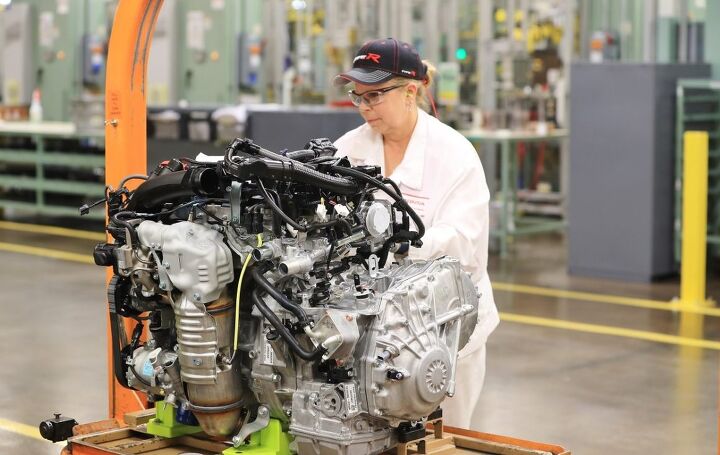Automakers Claim Robots Won't Steal Any More Jobs - For a While, Anyway

The car industry was one of the first to employ widespread automation as a way to streamline manufacturing. However, plenty of jobs have been handed over to robots since the 1980s. Cashiers, tollbooth operators, librarians, and practically everyone who has worked in shipping has seen some aspect of their job replaced with automation. But automakers now claim the usefulness of robots has reached its peak — at last for the time being.
In the midst of an autonomous revolution where drivers will be eventually be replaced by computer-controlled vehicles, numerous carmakers suggest robots still can’t substitute humans on the assembly line.
That, of course, comes with a caveat. Robots will still be in charge of performing some of the more dangerous and repetitive tasks. It just makes more sense to leave painting and welding to a mindless drone.
They’re also great at driving screws, but not so hot at wriggling into those tight spaces where you’ll sometimes find them, nor are they particularly good at swapping over to install the seemingly endless options a customer might want on their new car. For that, you need the fleshy, adaptive frame of a human being.
“We can’t find anything to take the place of the human touch and of human senses like sight, hearing and smell,” Tom Shoupe, the chief operating officer of Honda’s Ohio manufacturing unit, told Bloomberg in a recent interview.
Toyota has also promised a reduced need for robotics in its manufacturing. It claims to use just a handful of automated units at the Camry final assembly line at its plant in Georgetown, Kentucky, and doesn’t see a need to add any more, according to chief production engineer Mark Boire. However, it is the last leg of the manufacturing process where machines are the least useful. Fitting various trim pieces is one of the elements of car building where humans have the clear advantage.
That’s one reason why, in 2016, Mercedes-Benz said it actually planned to scale back automation. Luxury customers like options and, with more choices than ever, Mercedes said it needs to lean on real people to install them.
All of this is in direct opposition to studies and reports that robots would soon usurp every human-held job. Don’t be mistaken — automation is still coming. There may even be a point where we have to reassess the very nature of society once there aren’t enough jobs for people to do. But, in the short term, robots are still really bad at plenty of jobs. Call an automated customer service line with any nuanced problem if you don’t believe me. A single curveball is all it takes to grind a robot’s progress to a screeching halt.
Back in Ohio, Honda’s Marysville plant manager Rob May said the 10th-generation Accord isn’t possible without people and robots working together. While the factory may have installed 342 welding robots to assemble the vehicle’s body, he claims the rest of the process requires near-constant human involvement. May said the factory only has about 20 robots on the final assembly line, with a human workforce that is 4,200 strong.
“You have to have timing,” said James Erwin, a 15-year Marysville plant veteran working in tandem with a blue robot nicknamed G-Smurf. “I don’t think robots can take over. They don’t have the manual dexterity or judgment that we have.”
We can’t assume that will always be the case. One good leap forward in technology could be all it takes for the automotive industry to see another push toward robotics. Some manufacturers are already banking on it.
Tesla, which always seems to have its eyes on the far-off future, wants to develop an “alien dreadnought” factory that’s entirely automated. Tesla CEO Elon Musk claimed such a plant would be able to surpass current production speeds and eliminate job-related injuries. Of course, it would also eliminate jobs. The company purchased Perbix, a private machining firm that makes automated equipment for factories, last November to help it reach that goal.
That’s not to pick on Tesla, either. Only a boutique manufacturer (which are becoming less common these days) would option for hand-built cars when there’s a cheaper and safer alternative. As kind as these mainline manufacturers sound for keeping people employed, it’s a necessary solution to an automation problem nobody has been able to solve. Even if they do care about their employees, they won’t be competitive once a rival company has a major breakthrough in robotics — and, believe us, they are all working on it.
[Image: Honda Motor Company]

A staunch consumer advocate tracking industry trends and regulation. Before joining TTAC, Matt spent a decade working for marketing and research firms based in NYC. Clients included several of the world’s largest automakers, global tire brands, and aftermarket part suppliers. Dissatisfied with the corporate world and resentful of having to wear suits everyday, he pivoted to writing about cars. Since then, that man has become an ardent supporter of the right-to-repair movement, been interviewed on the auto industry by national radio broadcasts, driven more rental cars than anyone ever should, participated in amateur rallying events, and received the requisite minimum training as sanctioned by the SCCA. Handy with a wrench, Matt grew up surrounded by Detroit auto workers and managed to get a pizza delivery job before he was legally eligible. He later found himself driving box trucks through Manhattan, guaranteeing future sympathy for actual truckers. He continues to conduct research pertaining to the automotive sector as an independent contractor and has since moved back to his native Michigan, closer to where the cars are born. A contrarian, Matt claims to prefer understeer — stating that front and all-wheel drive vehicles cater best to his driving style.
More by Matt Posky
Latest Car Reviews
Read moreLatest Product Reviews
Read moreRecent Comments
- Canam23 I've rented them and found them...fine. I wish Ford had continued with or came up with a new generation Fusion which was a far better sedan.
- MaintenanceCosts The ES will do well in an electric version, assuming it's more thoroughly baked than the half-finished RZ. There's plenty of the Lexus customer base who use planes whenever they travel and don't need to drive their own cars outside the metro area.
- Legacygt It was more than 20 years ago that the Bangle designed BMW sedans started looking a little bit awkward. But the lineup today is chock full of downright ugly vehicles. This is one of them.
- Jeff It does state in this article that Europeans as well as Americans have cooled on EVs. I can see push back from consumers on the 2035 deadline for EVs in Europe and in states like California. I have no problem with manufacturers offering EVs but many for at least now don't want EVs. Maybe GM instead of planning to do away with the Malibu to make more EVs, GM should have offered the Malibu as a hybrid only like Toyota is offering the Camry for 2025. It would cost GM a lot less to offer a hybrid Malibu and it would outsell any EV that plant would produce. I even think GM would increase sales of the Malibu as a hybrid only and more competitive pricing.
- Kwik_Shift_Pro4X I fell asleep looking at that image.


































Comments
Join the conversation
The author did quote quite a few people at auto plants, but what about the robot makers themselves. With out their input this is close to a useless article.
A clear example of automation potential is pharmacies. Pharmacy staff are expensive, especially the pharmacists. A machine can mix powders and liquids (and gasses) to order in a more timely manner than a human and do so with perfect safety (e.g. instantly check the patients medical history to ensure no adverse drug interactions are possible). The robot will not itself steal the drugs (unless programmed to do so) and does not mind existing inside an airless theft proof box with a 24/7/365 work schedule. The doctors prescription is transmitted electronically and the prescription is filled within minutes. Any prescription questions can be addressed with a video conference to a licensed pharmacy consultation (call) center located anywhere in the world where skilled labor is cheaper. As ATM's replaced most bank tellers in the 1980s with 24/7/365 service, the same should be true of pharmacies.